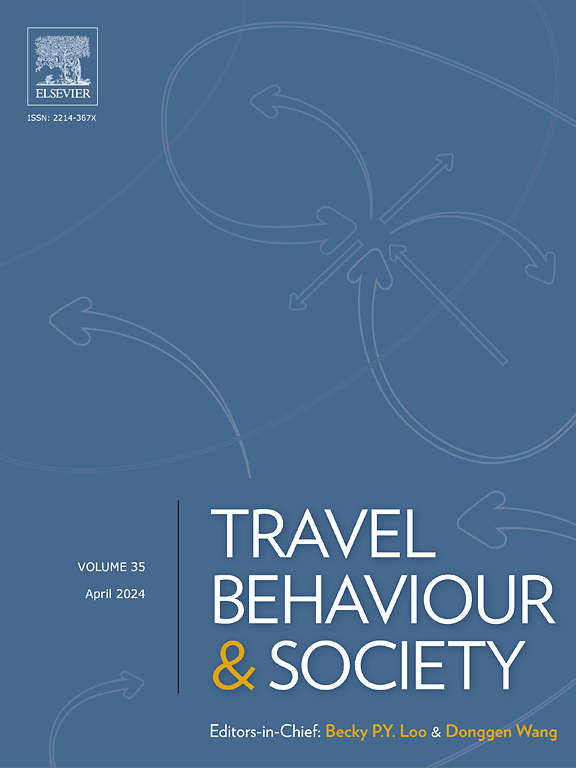“I care about transport sustainability, but i have children”: Open-text surveys highlight the concerns of families with children
IF 5.7
2区 工程技术
Q1 TRANSPORTATION
引用次数: 0
Abstract
The importance of providing access to quality public transport has been discussed in numerous literature and reports. Despite growing recognition of the need for inclusive public transport, the specific mobility needs of children and their caregivers remain largely overlooked in transport planning and evaluation. Conventional assessments—which rely on structured, expert-driven criteria such as accessibility, punctuality, and safety— often fail to capture the nuanced capabilities and unequal access experienced by underrepresented groups, such as families with children. This study addresses this gap by adopting an inductive approach to analyze open-text responses from survey data collected between 2022 and 2023 by the Swedish Public Transport Association. Employing sentiment and content analysis, we investigated how the survey respondents address children-related accessibility challenges and concerns about traveling by public transport while accompanying children. Approximately 15 % of the survey respondents answered the open-text questions, with around 3 % (415 individuals in 2022 and 588 in 2023) specifically mentioning the words “child” or “children.” Reviewing the responses, we identified four key concerns that constrain the capabilities of children and their caregivers: (1) time-management pressures, (2) affordability and value concerns, (3) safety concerns, and (4) comfort and convenience limitations. Through the lenses of transport justice and capability theory, we argue that capability deprivation could reinforce car dependency or reduce mobility and social participation opportunities for families with children. The results underscore the need to integrate child- and caregiver-specific needs into public transport planning and design. Furthermore, this study highlights the value of unstructured public feedback in revealing unmet mobility demands and nuanced quality expectations, which are critical for ensuring equitable access to sustainable transport for all citizens.
“我关心交通的可持续性,但我有孩子”:开放式文本调查强调了有孩子家庭的担忧
提供高质量公共交通的重要性已经在许多文献和报告中讨论过。尽管人们日益认识到包容性公共交通的必要性,但在交通规划和评估中,儿童及其照顾者的具体移动需求在很大程度上仍被忽视。传统的评估依赖于结构化的、专家驱动的标准,如可及性、准时性和安全性,往往无法捕捉到代表性不足的群体(如有孩子的家庭)所经历的细微差别和不平等机会。本研究通过采用归纳方法分析瑞典公共交通协会在2022年至2023年间收集的调查数据中的开放文本回复,解决了这一差距。采用情感分析和内容分析的方法,我们调查了受访者在陪同儿童乘坐公共交通工具时如何应对与儿童相关的无障碍挑战和担忧。大约15%的受访者回答了开放文本问题,大约3%(2022年为415人,2023年为588人)特别提到了“孩子”或“孩子”这个词。通过对调查结果的回顾,我们确定了制约儿童及其照顾者能力的四个关键问题:(1)时间管理压力;(2)负担能力和价值问题;(3)安全问题;(4)舒适和便利限制。通过交通公平和能力理论的视角,我们认为能力剥夺可能会加强对汽车的依赖,或减少有孩子家庭的流动性和社会参与机会。研究结果强调,需要将儿童和照顾者的具体需求纳入公共交通规划和设计。此外,本研究强调了非结构化的公众反馈在揭示未满足的交通需求和细微的质量期望方面的价值,这对于确保所有公民公平获得可持续交通至关重要。
本文章由计算机程序翻译,如有差异,请以英文原文为准。
求助全文
约1分钟内获得全文
求助全文
来源期刊

Travel Behaviour and Society
TRANSPORTATION-
CiteScore
9.80
自引率
7.70%
发文量
109
期刊介绍:
Travel Behaviour and Society is an interdisciplinary journal publishing high-quality original papers which report leading edge research in theories, methodologies and applications concerning transportation issues and challenges which involve the social and spatial dimensions. In particular, it provides a discussion forum for major research in travel behaviour, transportation infrastructure, transportation and environmental issues, mobility and social sustainability, transportation geographic information systems (TGIS), transportation and quality of life, transportation data collection and analysis, etc.
 求助内容:
求助内容: 应助结果提醒方式:
应助结果提醒方式:


